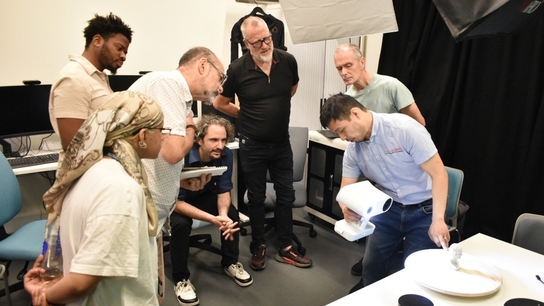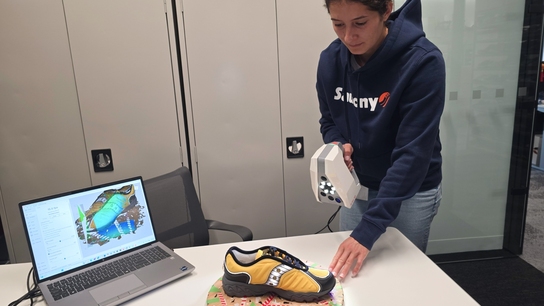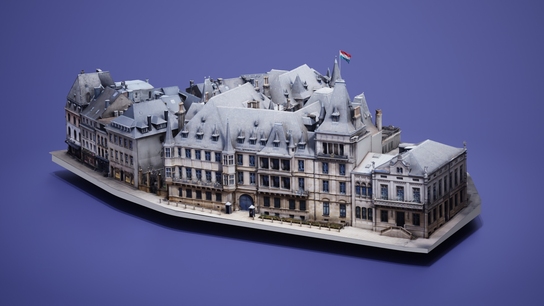Revealing the face of Britain's first man with Artec Space Spider
The Goal: To scan in ultra-high-detail the skull of Britain's most ancient man in mere minutes, then to use the 3D model and DNA to help recreate the unforgettable appearance of the first Brit.
Tools Used: Artec Space Spider, Artec Studio
Artec Space Spider, the cutting-edge metrological 3D scanner, played a vital role in one of the most exciting DNA projects of our time, initiated and produced by the Plimsoll Productions, a UK based independent production company that creates and produces non-scripted shows for the national and international market and has won BAFTAs, Emmys and RTS awards for their creative work. The captivating documentary that was shot during the project was later screened by Channel 4 in the UK.
Due to the relatively recent archaeological findings in England, for the first time in history, professionals from both the UK and Holland, embarked on an amazing venture to discover what did the first ever Brit actually look like, where did he come from and how is he related to the British people today. The results of this ambitious project were astounding and forever changed the way the people in Britain envisioned their predecessors.
Watch the video to see the whole process around the discovery of the appearance of the first ever Brit!
Though 3D technology is usually perceived as a futuristic concept, a recent project it was involved in proved that it could also take us back in time. Over 10 000 years back in time to be exact.
The first and only complete skeleton ever, was unearthed in Gough's Cave, located in the Cheddar Gorge, Somerset, England, a little over 100 years ago, marking an important archaeological milestone. Despite having the remains of the first Brit for over a century, conducting a full DNA analysis has only become possible today, largely due to the recent developments and breakthroughs in the DNA science field. Data, that would previously take at least 3 years to generate, today, can be acquired in just 24 hours! Scientists from the Natural History Museum attained the DNA information needed to reconstruct the appearance of the Cheddar Man, from the bone powder extracted from his skull. Though there was a risk of not being able to gather enough DNA data due to it breaking down over time, everyone involved breathed the sigh of relief, when the results came back. Turns out, the environment of the Gough's Cave, where the Cheddar Man’s skeleton was unearthed, preserved the DNA information perfectly!

Cheddar man’s skull. Picture courtesy of Patrick Thorn & Co
One of the first stages in reconstructing the appearance of the Cheddar man was scanning the recovered skull with the ultra-precise Artec Space Spider 3D scanner, performed by Artec’s gold certified partner, Patrick Thorn & Co, capturing the 3D data in high-detail at an accuracy of up to 0.05 mm. Initially designed for use on the International Space Station, this 3D scanner, paired with the all-round Artec-Studio 12 scanning and post-processing software, was the best possible solution for this project, capturing fine details of the skull, such as teeth, perfectly. Taking only 12 minutes to capture the whole of the skull and a little over 30 minutes for post-processing, the print-ready 3D model was done in just under an hour.

Scanning of the Cheddar Man’s skull with Artec 3D Space Spider. Picture courtesy of Patrick Thorn & Co
The final STL file of the 3D model was then sent to a Dutch company, Minke Products, to 3D print a 1:1 skull on an Ultimaker 2 extended 3D printer, using the PLA material. Mere 19 hours later, the Kennis brothers, one of the best prehistoric 3D model makers, already had the exact replica of the Cheddar man’s skull, so that they can begin the reconstruction of the facial tissues, skin and hair based on the results of the DNA analysis.
While the Kennis brothers were working hard on rebuilding the face of the first Brit, using the process of adding the pins, and clay by hand, the results of the DNA test were also sent to the UCL in London for further analysis. The team at the University College London examined the data to conclude what that the Cheddar Man really looked like, including the colour of his eyes, hair and skin. The end results were surprising, and went against the main misconception of the general public, who thought the first Brit probably had fair skin, blue eyes and looked a Viking!
After all the hard work done by everyone involved in this astonishing project, we are finally brought face to face with the first ever Brit! Looking at the unusual combination of his very dark skin, curly hair and piercing blue eyes, the results are definitely not what anybody has expected at all!

Image source: BBC.com
Artec 3D is extremely proud to have greatly contributed to this aspiring project, which will surely go down in history. We strive to create precise and reliable 3D scanning solutions, that have proven to be the go-to tools on multiple occasions, including the Cheddar Man project.
Scanners behind the story
Try out the world's leading handheld 3D scanners.





